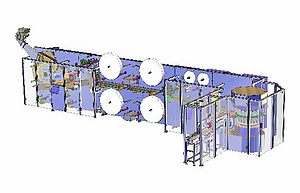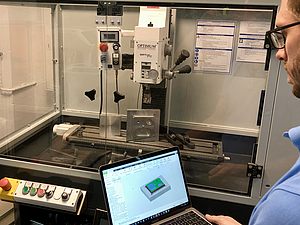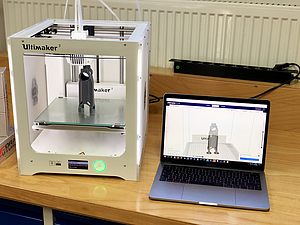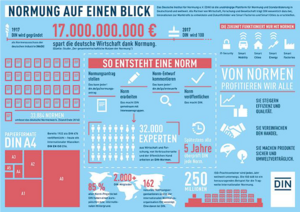Courses
From technical drawing to numerical methods for the design of complex components and assemblies, we teach important fundamentals for future mechanical engineers and product developers in various teaching formats.
| Detailed descriptions of the content and examination formats of the individual courses can be found in the study portal and in the module handbook for your degree program. |
-
Dealing with pressure equipment made up of apparatus elements is part of everyday life in the field of process engineering. The Apparatus Elements course covers the main apparatus elements, their strength design and their practical application. The examination takes place parallel to and following the lecture as an assessed project. Students apply the knowledge they have learned to the design of cylinders, flanges, etc. in their own design of a process plant.
Contact: Prof. Dr.-Ing. Armin Lohrengel Language: German Module number: S 8700 -
Planning and designing process engineering systems are complex tasks that are carried out in practice by experts from various disciplines. The course Apparative Plant Engineering I explains the development process of process engineering plants and teaches basic terminology and methods for economic planning, the creation of flow diagrams and safety-related design. The mathematical design of pipelines and the selection of suitable pumps and fittings for different applications are also covered.
Contact: Prof. Dr.-Ing. David Inkermann Language: German Module number: W 8701 -
The course provides an insight into which engineering principles can be used in devices, machines and systems and how to proceed with design and production. The basics of mechanics with their applications in mechanical engineering as well as measurement and control technology in interaction as a mechatronic product are covered. In addition, the necessary manufacturing, joining and quality assurance options are presented.
Contact: Dr.-Ing. Günter Schäfer Language: German Module number: S 8147 -

Modern production machines must be reliable, highly flexible and work at the highest possible speed. The module Elements of Mechanical and Plant Engineering teaches methods for planning, developing and dimensioning production machines. The basics of electrical and pneumatic drive technology, handling systems and automation concepts are presented. In addition, rules of ergonomic, hygienic and safety-compliant design are covered and demonstrated using application examples from medical technology and the food industry.
Contact: Prof. Dr.-Ing. Armin Lohrengel Language: German Module number: S 8108 -

Within the development methodology module, students are taught the process of methodical product development. In order to put the content directly into practice, annually changing, cutting-edge tasks are worked on in conjunction with industry partners. Students also have direct contact with engineers from industry in order to make initial contacts for their professional life.
Contact: Prof. Dr.-Ing. Armin Lohrengel Language: German Module number: W 8105 -

The term biomechanics describes the interdisciplinary science that involves the interaction of the musculoskeletal system and the associated anatomy, physiology and mechanics. At the IMW, a bicycle ergometer was constructed and equipped with measurement technology so that the biomechanical analysis of cycling can be carried out. The content of the practical course is the execution of the examination, recording of measured values and the evaluation and conclusion of various movement sequences.
Contact: Prof. Dr.-Ing. Armin Lohrengel Language: German Module number: S 9436 -

The FEM practical course with ANSYS builds on a solid knowledge of technical mechanics and teaches the basics of PC-supported FE simulation using the ANSYS Workbench program. In addition to the basic operation of the program, the first simple structural-mechanical FE models are set up and simulated independently at the PC workstation. One focus of the course is on the evaluation of the independently generated calculation results. The practical course consists of ten individual sessions and concludes with the completion of a project task as part of group work.
Contact: Prof. Dr.-Ing. Armin Lohrengel Language: German Module number: S 8758 / W 8758 -

Students learn how to apply their theoretical knowledge to practical experiments in the machine laboratory. As part of the practical course, the Institute of Mechanical Engineering offers an experiment on cardan shafts. The two non-shiftable couplings, constant velocity and universal joint shafts are examined in parallel. The effects observed in practice are then explained and presented in a practical report based on theoretical principles.
Contact: Prof. Dr.-Ing. Armin Lohrengel Language: German Module number: W 8359 -

In this practical course, the basic knowledge of the finite element method acquired in the FEM practical course with ANSYS is deepened. Structural-mechanical simulations are carried out independently at the PC workstation using the ANSYS software. In addition to methods for simplifying complex models, different meshing methods and their evaluation, non-linear problems are also considered and solved. The practical course consists of ten individual sessions and concludes with the completion of a project task as part of group work.
Contact: Prof. Dr.-Ing. Armin Lohrengel
Language: German
Module number: S 8153 / W 8153
-

The course Machine Acoustics deals with the metrological, mechanical and labor law considerations of vibrations, noise and their effects. A comprehensive theoretical overview of measurement technology and methods is provided and consolidated through practical exercises.
Contact: Prof. Dr.-Ing. Armin Lohrengel Language: German Module number: W 8118 Video recordings of the course can be found here. -

The module Machine Elements I&II introduces the basics of design, production and applicability of components as well as the design of typical machine elements and components. During the course, the calculation principles are discussed in a practical manner and their areas of validity are taught. This procedure is supported with the help of exemplary calculations in the practical lessons. In addition to these exercises, a guided practical project is carried out as additional content, where all the content taught in the lecture is tested.
Contact person
Course language
German
Module number
W 8103 / S 8102
Sample exams
Assignment Sample solution WS 2016/17 Solution SS 2016 Solution WS 2015/16 Solution SS 2015 Solution -
The aim of mechanical engineering is to design good, economical and reliable machines and systems. To this end, the fundamentals of mechanics are transferred to the application in machine elements such as shafts, bearings, screws and couplings so that strength verifications for elements and connections can be created. In addition, design details in the interaction of the elements as a product and economic aspects of the production and use of the product are considered.
Contact: Dr.-Ing. Günter Schäfer Language: German Module number: W 8107 Additional materials
Video recordings of the course can be found here. Sample exams
Task Sample solution -

The loss-free and error-free exchange of data is a central prerequisite for successful and efficient product development. This practical course teaches the basics of preparing, managing and providing product data in the development process using a selected PDM system. The focus here is on product structure and document management, classification and characteristics, project management and workflow and process management. The individual functions are worked on using examples and case studies. The practical course is held as a block course.
Contact: Prof. Dr.-Ing. David Inkermann Language: German Module number: S 8158 -

In the practical course Design and Simulation with 3D-CAD (formerly Design and Simulation with ProE (Creo)), practical basics and modern methods of computer-aided product development are taught and applied in practice. In addition to different strategies of geometric product modeling, parametric and feature-based modeling as well as methods of kinematic modeling and simulation and the creation of virtual reality scenes are taught. The procedures, methods and tool functions are deepened by means of a practical project task.
Contact: Prof. Dr.-Ing. David Inkermann Language: German Module number: W 8151 -

In the Project Machine Elements module, knowledge of machine elements is applied and modified through independent transfer to new problems in finding solutions for assembly designs. The assembly designs are to be checked under stress aspects and drawings (CAD) and sketches are to be derived that are suitable for production and assembly. The solutions are to be presented to the design group, argued for and the solutions of fellow students are to be assessed. The individual work steps must be planned and completed on time.
Contact person:Prof. Dr.-Ing. Armin Lohrengel Language: German Module number: S 8104 -

The course Computer Integrated Manufacturing introduces students to computer-aided product development. The focus here is on the interaction of tasks and information from design and production planning and control. Selected methods for work planning, quality management and rapid manufacturing are taught. In addition, technology paradigms of Industry 4.0 are taught and basic functions and fields of application of cyber-physical (production) systems are explained.
Contact: Prof. Dr.-Ing. David Inkermann Language: German Module number: S 8108 -

The Computer Integrated Product Development course teaches the methodological and technological fundamentals of computer-aided product conception and design. The focus is on product modeling and data technology as well as data exchange in the product life cycle. Important applications of CAD systems are integrated into the process chain and illustrated using examples. Product lifecycle and workflow management are also covered.
Contact: Prof. Dr.-Ing. David Inkermann Language: German Module number: W 8108 -

In order to deepen knowledge within product development, the course Resource-efficient product development imparts knowledge from various specialist areas. From the systematic development of series and modular systems to expansion-oriented design and products for the circular economy. Students acquire valuable knowledge for the design of resource-efficient and sustainable products.
Contact: Prof. Dr.-Ing. Armin Lohrengel Language: German Module number: W 8105 -

The mechanical engineering seminar is offered alternately each semester by the central mechanical engineering institutes at Clausthal University of Technology. As part of the seminar, knowledge of how to present technical contexts to an audience is taught. To this end, the participants prepare themselves independently for their chosen subject area, structure the central statements into a well-rounded presentation and then receive a constructive assessment of the type and structure of the presentation. At the end of the course, participants will be able to give a presentation suitable for an audience.
Contact: Prof. Dr.-Ing. Armin Lohrengel Language: German Module number: W 8171 -

The course Technical Standardization introduces students to the technical, economic and legal significance of standardization. Together with the students, the development process of standards is worked out and the implementation of standardization projects in standardization committees at national, EU and ISO level is discussed. As part of the course, students can optionally obtain the DIN certificate in basic knowledge of standardization through an additional achievement.
Contact: Prof. Dr.-Ing. David Inkermann Language: German Module number: S8116 -

The Technical Drawing/CAD course comprises two consecutive exercise parts. The first part teaches the basics of technical representation and standard-compliant drawing. In four exercises, students learn how to create standard-compliant technical drawings using pencil and paper. The second part of the course teaches the basics of computer-aided design using the 3D CAD system PTC Creo. For this purpose, 3D components are created and combined to form simple assemblies and standard-compliant technical drawings and parts lists are created. The CAD exercise part includes an application project.
Contact person
Language: German
German
Module number
S8101/ W8101
Videos
